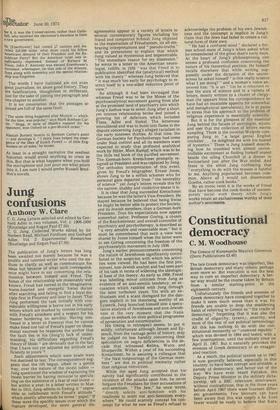Constitutional democracy
C. M. Woodhouse
The Greece of Karamanlis Maurice Genevoix (Doric Publications £3,40) The late Greek democracy was imperfect, like British democracy and many others: perhaps even more so. But execution is not the best way to cure an imperfect democracy. A better way would be the course taken by Britain from a similar starting-point in the eighteenth century. Unfortunately the friends and enemies of Greek democracy have conspired together to make it seem much worse than it was. Its friends are unable to drop the maddening habit of referring to Greece as "the cradle of democracy," forgetting that it was also the cradle of oligarchy, tyrann j, anarchy, and most of the rest of our political terminology. All this has nothing to do with the constitutional monarchy or "crowned republic" which was devised in 1864 and lasted, with a few interruptions, until the military coup on April 21, 1967. But it naturally provokes the enemies of Greek democracy to an exaggerated reaction.
As a result, the political system up to 1967 is now generally believed, especially in this country, to have been corrupt and unstable, a parody of democracy, and better out of the way. We have even heard Pattakos, the Deputy Prime Minister in the military dicta torship, tell a BBC television interviewer, without contradiction, that in the three years
before April 1967 there were fourteen different governments. Few listeners can have been aware that this was simply a lie. Even. fewer would be ready to believe that Kara
manlis held a parliamentary majority as Prime Minister for a longer continuous period than any British Prime Minister since Asquith; for although it is a fact, it does not fit. the accepted stereotype.
During the fifteen years between the general election of 1952 and the military coup of 1967 there were effectively only four parliamentary Prime Ministers: Alexander Papagos (1952-53), Constantine Karamanlis (195563), George Papandreou (1963-65), and Stephanos Stephanopoulos (1965-66). The other names that would figure in the lists of Pattakos and other critics of Greek democracy fall into two categories: firstly, ' caretakers' ap pointed by a constitutional convention for a few weeks to supervise general elections; and secondly, nominees appointed by the Crown, without parliamentary support, in pursuit of . the tragic mania of Greek monarchs for per
t. sOnal intervention in the process of government. The latter was the fatal defect which led.to, the military coup. But it was the defect oftha monarchy'which could not learn to be ctinktitutiofialrrfot of Greek democracy.
Karamahqtwilimself was both the beneficiary and,'' Te victim of this defect. Al
though still i( lAtively unknown in 1955, he
was the unexpected choice of King Paul to become Prime Minister when Papagos died.
Eight years later, having in the meantime won three general elections, he resigned when the King (and more particularly the Queen) rejected his advice against under taking a state visit to London in the summer of 1963. There can be no doubt that whether Karamanlis's advice was right or wrong, he was constitutionally entitled to give it, and the consequent crisis was the fault of the Crown. The circumstances are well described in M. Genevoix's sympathetic biography.
But his book also reveals, unfortunately, a genuine weakness of the practitioners of Greek democracy, from which Karamanlis himself cannot be exempted. Even those Greeks who believe most sincerely in democracy have sometimes failed to identify their real 'enemy correctly. In an interesting
introdUction to the book, Professor Costa TsatSbA,'Who was a Minister under Karaman, lis,'4001ishes 61' long communication dated in 1966, in which Karamanlis clearly showed
that he saw the main enemy of his own con
cont:eption of democracy in his Liberal opponent, George Papandreou, whom he accused
of underhand, dishonourable and undemo cratic/practiees. It should be noted that this letter, VOitth.did not appear in the French edi tion of IVIfittevoix's book, was written six months befplie the real enemies of Greek democracy revealed themselves in the military coup.
The blindness, was the same on both sides of Greek politics. Papandreou used to accuse Karamanlis equally bitterly of fiddling the
elections. Neither saw that the real enemy was outside the political system, not inside it. Each thought his chief enemy was the other. It is not surprising that the world took both of them at their word, and concluded that Greek democracy was its own worst enemy. Hence those who are aware of what has been happening at all are apt to ask: "What can you expect?"
M. Genevoix is at pains to suggest that better things could have been expected, and he is right. His admiration of Karamanlis falls not much on this side idolatry, and his style is a literary French which the translator has, if possible, exaggerated. His way of saying that Karamanlis was a political realist, for example, is: " The son of a sea-going race, and also of the workers in the fields, the pictures of the earth suited him as well as those of the sea." But his portrait of Greece's most successful Prime Minister since Venizelos is, on the whole, moving and convincing.
C. M. Woodhouse, atahor of several books about Greece, was in command of the Allied Military Mission to the Greek guerillas during the second world war.



































 Previous page
Previous page